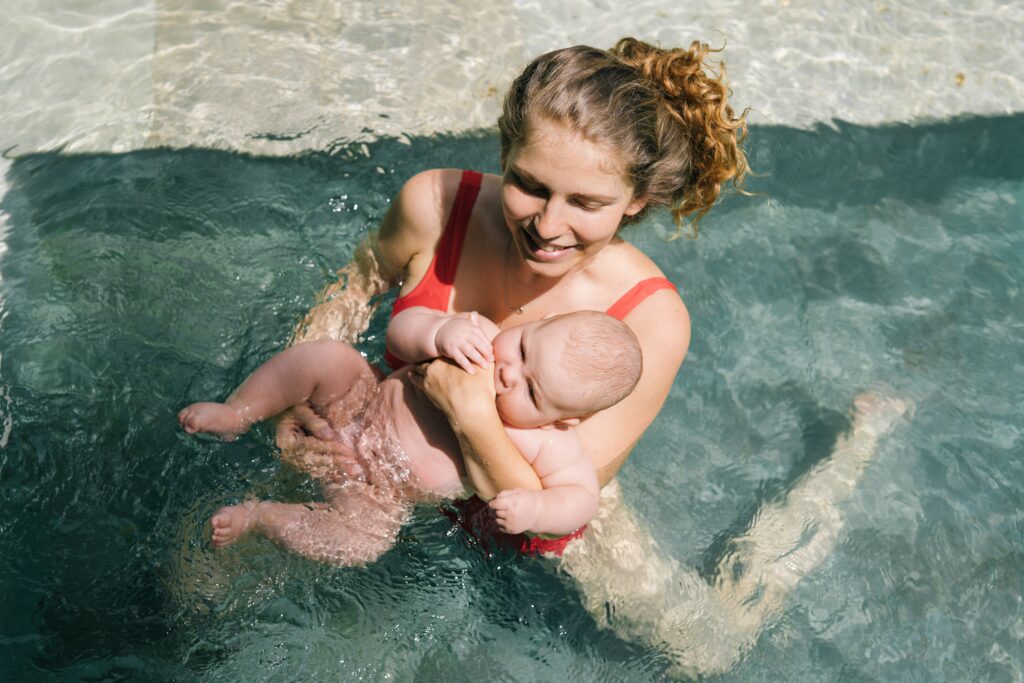 As a Certified Breastfeeding Counselor, parents are going to ask you many questions about breastfeeding. Breastfeeding during the summer can bring up more questions than you might imagine before you work with clients.
As a Certified Breastfeeding Counselor, parents are going to ask you many questions about breastfeeding. Breastfeeding during the summer can bring up more questions than you might imagine before you work with clients.
From how to best feed baby to how to manage feeling so hot, there are many myths to break and tips to share. While you will learn these things in your training, a little refresher can always be helpful. It can also be nice to have an easy resource to remember these little things that can feel big to new parents.
Do Breastfed Babies Need Water?
When we think of summer and little kids, pregnant women, and anyone outside, we often associate heat with hydration. We think of water as being the best way to ensure good hydration. This can lead to parents wondering if their baby needs something besides just breastmilk.
While water was once offered to quite young babies, we have since learned babies have extremely sensitive electrolyte levels. Giving just water can throw off the electrolytes of small babies and become a serious medical emergency.
For exclusively breastfeeding infants under six months, no water, formula, or solids are necessary. Breastmilk is an everchanging substance which ensures adequate hydration in hot weather. Babies are likely to nurse more frequently during hot weather, but not every infant does.
For babies who are formula fed and under six months, it is important to only provide properly prepared formula, not watered-down formula. Parents should only give water if directed by their pediatrician.
For infants who have begun solids, are over six months, small amounts of water can be given. It is typically recommended that no more than 2-4 ounces of water be given per day. While it is safe to provide up to eight ounces per day, giving too much water can inadvertently replace breast milk or formula in the baby’s diet. This can lead to inadequate nutrient intake.
How Can You Handle Heat Breastfeeding During The Summer?
Many new parents are navigating fluctuating postpartum hormones making them already prone to overheating. Add in summer weather and a Velcro baby, and well, breastfeeding can get quite uncomfortable.
For new parents struggling with the heat, they might find it helpful to:
- Remain well hydrated, consider electrolyte beverages if needed
- Avoid direct sun exposure, use shade, hats, etc.
- When extremely warm, use air-conditioned spaces, fans, etc.
- Wear light clothing to avoid overheating oneself with baby’s body heat during feeds
- Dip feet in cool water while feeding if find comfortable
- Sleep with light bedding to accommodate night feeds
- Avoid using blankets or heavy feeding covers when out and about
- Wear light colored clothing
There is not much a breastfeeding parent needs to do compared to a non-breastfeeding parent in the heat. However, it is important for them to be more aware of the susceptibility to discomfort and dehydration because they are lactating.
Every ounce a baby drinks is coming directly from their body. It makes staying hydrated always important but especially during hot weather. If they must be outdoors during the heat, encourage them to plan.
Do Not Forget To Eat – Breastfeeding During The Summer
For some people, extreme heat can make them less hungry. While this is not a major concern, when you are breastfeeding, it is important to get adequate nutrition and calories. Remind your clients to eat, even if it is just light, small, frequent meals.
Things such as nuts, fruit, electrolyte beverages, salad with a protein, veggies and dip, can all add some nutrition even when their appetite is low. It is also important to remind them that a day or two of eating less is not likely significant for them or their baby. They do not need to stress about a day at the beach.
However, if they are frequently outdoors and find their appetite is significantly less, encourage them to plan. Nutrient dense but light foods can help them get in more nutrition. Some parents really like protein shakes and smoothies on extremely hot days.
As a certified breastfeeding counselor, you can help prepare and support parents through many stages of lactation. This even includes the different seasons of the year.